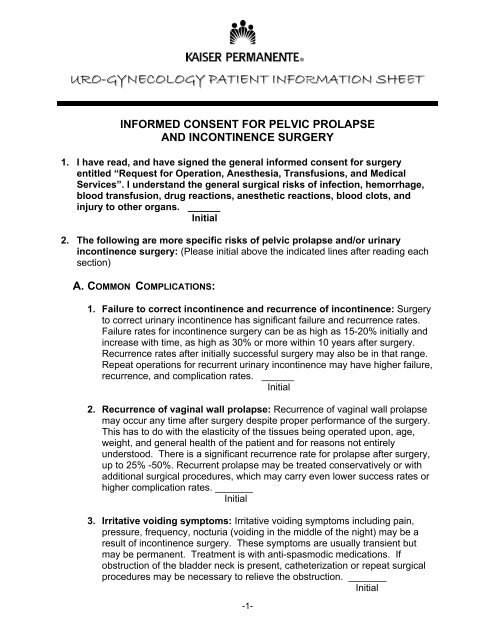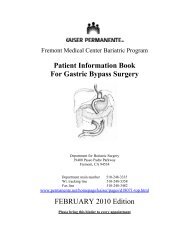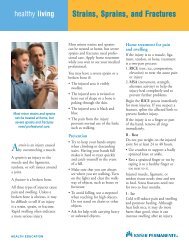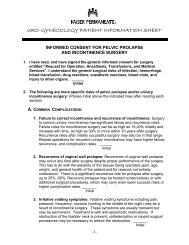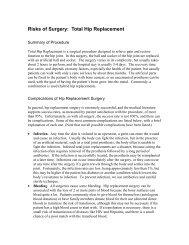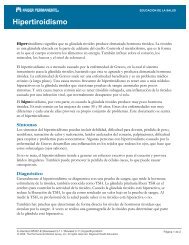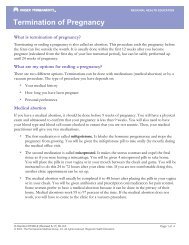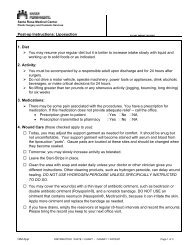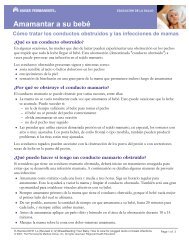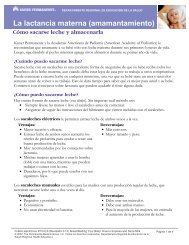informed consent for pelvic prolapse and ... - permanente.net
informed consent for pelvic prolapse and ... - permanente.net
informed consent for pelvic prolapse and ... - permanente.net
Create successful ePaper yourself
Turn your PDF publications into a flip-book with our unique Google optimized e-Paper software.
URO-GYNECOLOGY PATIENT INFORMATION SHEET<br />
INFORMED CONSENT FOR PELVIC PROLAPSE<br />
AND INCONTINENCE SURGERY<br />
1. I have read, <strong>and</strong> have signed the general <strong>in<strong>for</strong>med</strong> <strong>consent</strong> <strong>for</strong> surgery<br />
entitled “Request <strong>for</strong> Operation, Anesthesia, Transfusions, <strong>and</strong> Medical<br />
Services”. I underst<strong>and</strong> the general surgical risks of infection, hemorrhage,<br />
blood transfusion, drug reactions, anesthetic reactions, blood clots, <strong>and</strong><br />
injury to other organs. ______<br />
Initial<br />
2. The following are more specific risks of <strong>pelvic</strong> <strong>prolapse</strong> <strong>and</strong>/or urinary<br />
incontinence surgery: (Please initial above the indicated lines after reading each<br />
section)<br />
A. COMMON COMPLICATIONS:<br />
1. Failure to correct incontinence <strong>and</strong> recurrence of incontinence: Surgery<br />
to correct urinary incontinence has significant failure <strong>and</strong> recurrence rates.<br />
Failure rates <strong>for</strong> incontinence surgery can be as high as 15-20% initially <strong>and</strong><br />
increase with time, as high as 30% or more within 10 years after surgery.<br />
Recurrence rates after initially successful surgery may also be in that range.<br />
Repeat operations <strong>for</strong> recurrent urinary incontinence may have higher failure,<br />
recurrence, <strong>and</strong> complication rates. ______<br />
Initial<br />
2. Recurrence of vaginal wall <strong>prolapse</strong>: Recurrence of vaginal wall <strong>prolapse</strong><br />
may occur any time after surgery despite proper per<strong>for</strong>mance of the surgery.<br />
This has to do with the elasticity of the tissues being operated upon, age,<br />
weight, <strong>and</strong> general health of the patient <strong>and</strong> <strong>for</strong> reasons not entirely<br />
understood. There is a significant recurrence rate <strong>for</strong> <strong>prolapse</strong> after surgery,<br />
up to 25% -50%. Recurrent <strong>prolapse</strong> may be treated conservatively or with<br />
additional surgical procedures, which may carry even lower success rates or<br />
higher complication rates. _______<br />
Initial<br />
3. Irritative voiding symptoms: Irritative voiding symptoms including pain,<br />
pressure, frequency, nocturia (voiding in the middle of the night) may be a<br />
result of incontinence surgery. These symptoms are usually transient but<br />
may be permanent. Treatment is with anti-spasmodic medications. If<br />
obstruction of the bladder neck is present, catheterization or repeat surgical<br />
procedures may be necessary to relieve the obstruction. _______<br />
Initial<br />
-1-
B. LESS COMMON COMPLICATIONS:<br />
1. Injury to the bladder or ureter: This may occur during hysterectomy or<br />
repair of anterior vaginal wall <strong>prolapse</strong> (cystocele), or bladder neck repairs <strong>for</strong><br />
urinary incontinence. Injury to the bladder may require prolonged urinary<br />
catheterization <strong>and</strong> may result in bleeding, infection, or, infrequently, fistula<br />
into the vagina (urine comes out through a hole into the vagina) , <strong>and</strong> painful<br />
or frequent voiding. Injuries to the bladder usually heal well but may result in<br />
the need <strong>for</strong> more extensive surgery or permanent symptoms. Injury to the<br />
ureter may result in prolonged catheterization or major surgery to correct the<br />
injury, including permanent damage to the ureter or kidney. ______<br />
Initial<br />
2. Bladder neck obstruction: Obstruction to the flow of urine is a known<br />
complication of surgery to correct urinary incontinence. Obstruction may be<br />
temporary, or permanent, requiring additional surgical procedures to relieve<br />
the obstruction. Initially, obstruction is usually treated with urinary catheters,<br />
either indwelling, or the patient is taught to catheterize herself several times a<br />
day until the obstruction is relieved. “Sling” procedures carry a higher risk of<br />
obstruction than traditional bladder neck elevation procedures, as high as<br />
25% in some reports. Catheters may be required <strong>for</strong> weeks after surgery until<br />
voiding becomes normal, or a decision is made to re-operate to relieve the<br />
obstruction. Operations to relieve bladder neck obstruction may not be<br />
entirely successful or multiple surgeries may be necessary. Permanent<br />
symptoms of obstruction including pain, pressure, urgency, <strong>and</strong> frequency<br />
may result. ______<br />
Initial<br />
3. Stricture of the vagina: Stricture, or narrowing, of the vagina may occur as a<br />
result of surgery to repair vaginal wall <strong>prolapse</strong>. This stricture may cause<br />
pain <strong>and</strong> difficulty with sexual intercourse. Stricture may be treated by vaginal<br />
dilatation or may require additional surgical procedures, including possible<br />
skin grafting. Stricture may be difficult to correct surgically <strong>and</strong> may result in<br />
permanent symptoms. ______<br />
Initial<br />
4. Fistula: A fistula, or hole from the ureter, bladder, or rectum, into the vagina<br />
may result from surgery on these organs. Fistulae may necessitate major<br />
surgery to correct the injury <strong>and</strong> may result in permanent catheterization <strong>for</strong><br />
the kidney, temporary or permanent colostomy, or permanent damage to the<br />
ureter, bladder, or rectum. ______<br />
Initial<br />
5. Injury to the bowel/rectum: This may occur during hysterectomy or repair of<br />
posterior vaginal wall <strong>prolapse</strong> (rectocele). A fistula (hole) may result in stool<br />
coming out into the vagina, requiring a temporary colostomy (surgery to divert<br />
the stool into a bag). Incontinence (leakage) of stool or gas may be a<br />
permanent result of rectal sphincter injury. More extensive surgery or<br />
resection (cutting out) of a portion of the bowel may be necessary <strong>for</strong><br />
significant injury to a portion of the bowel. ______<br />
Initial<br />
-2-
6. Infection, rejection, or erosion of graft material into the vagina, bladder,<br />
or rectum: Graft materials, either synthetic, or natural, may sometimes be<br />
used <strong>for</strong> anti-incontinence operations or to rein<strong>for</strong>ce the surgical repair of<br />
<strong>prolapse</strong>d, or sagging, vaginal walls. The graft material may become infected,<br />
<strong>and</strong>/or erode, slough, or become visible, through the vaginal wall,<br />
necessitating additional surgical procedures to remove the exposed portion of<br />
the graft, or remove the graft entirely. The graft may also erode into the<br />
bladder or rectum, necessitating additional procedures to remove the graft<br />
<strong>and</strong> repair the affected organ. Permanent damage to the vagina, bladder, or<br />
rectum may result. Surgical procedures to do so carry additional risk of failure<br />
to correct incontinence or <strong>prolapse</strong>, injury to adjacent structures, fistula, <strong>and</strong><br />
other complications as listed above. ______<br />
Initial<br />
7. Injury to the lumbo-sacral spine <strong>and</strong> <strong>pelvic</strong> nerves: This may occur<br />
secondary to either positioning of the body required <strong>for</strong> vaginal surgery or<br />
from retractors used <strong>for</strong> abdominal surgery. Injury to the discs is unlikely <strong>and</strong><br />
rarely injury may occur or to the nerve roots or the nerves themselves.<br />
Symptoms may include back, buttock, <strong>pelvic</strong>, leg or foot numbness <strong>and</strong>/or<br />
pain; difficulty with walking; abnormal bladder or bowel control or function.<br />
Injuries arising to these structures are usually transient but rarely, may be<br />
permanent. ______<br />
Initial<br />
I underst<strong>and</strong> that this is elective surgery in an attempt to improve my <strong>prolapse</strong> or<br />
incontinence symptoms. I have read the above in<strong>for</strong>mation on this <strong>consent</strong> <strong>for</strong>m<br />
<strong>and</strong> I am satisfied with my underst<strong>and</strong>ing of it. I have had an opportunity to ask<br />
questions concerning the above risks <strong>and</strong> am satisfied with my underst<strong>and</strong>ing of<br />
the complications described above. ______<br />
Initial<br />
_______________________________<br />
Patient Signature<br />
________________________________<br />
Witness<br />
________________________<br />
Date <strong>and</strong> Time When Signed<br />
________________________<br />
Date <strong>and</strong> Time When Signed<br />
-3-


